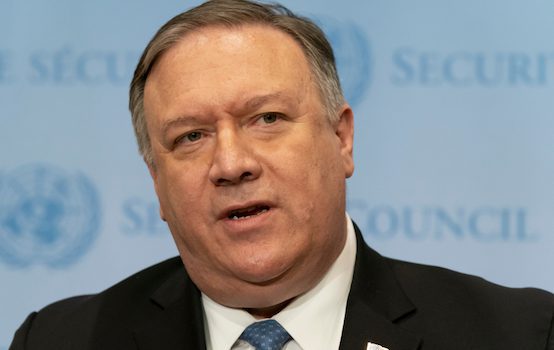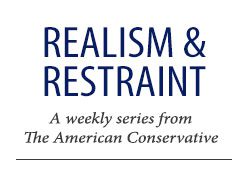Pompeo: Iranian Proxy Mobilizing in America’s Backyard

Hezbollah and Iran have “put down roots” in South America in America’s backyard, Secretary of State Mike Pompeo said last week in an interview with a Bloomberg reporter.
Unlike the interview Pompeo gave Friday with NPR reporter Mary Louise Kelly, where he cursed at her and accused her of lying, Pompeo’s statements hyping Iran’s national security threat south of the border received almost no notice from a press glued to impeachment proceedings.
Why is Pompeo suddenly directing increasingly heated rhetoric towards Iran and its proxies in South America?
“Anti-Iran hawks like Pompeo like to emphasize that Iran is not a defensively-minded international actor, but rather that it is offensively-minded and poses a direct threat to the United States,” said Max Abrahms, associate professor of political science at Northeastern and fellow of the Quincy Institute said in an interview with The American Conservative. “And so for obvious reasons, underscoring Hezbollah’s international tentacles helps to sell their argument that Iran needs to be dealt with in a military way, and that the key to dealing with Iran is … through confrontation and pressure.”
Stories highlighting the role of Hezbollah in America’s backyard “are almost always peddled by anti-Iran hawks,” he said.
Like Clare Lopez, vice president for research and analysis at the Center for Security Policy, who aligns with the argument that Hezbollah has been populating South America since the days of the Islamic revolution.
“From at least the 1980s, many Lebanese fled to South America, and among that flow Hezbollah embedded themselves,” she told The American Conservative in a recent interview. Their activity “really expanded throughout the continent” during the presidencies of Iran’s Mahmoud Ahmadinejad and Venezuela’s Hugo Chavez.
During that time, Lopez added, “there was a really strong relationship that developed…Iranians established diplomatic facilities, enormous embassies and consulates, embedded IRGC cover positions and MOIS (intelligence services) within commercial companies and mosques and Islamic centers. This took place in Brazil in particular but Venezuela also.”
Iran and Hezbollah intensified their involvement throughout the region in technical services like tunneling, money laundering, and drug trafficking. Venezuela offered Iran an international banking work-around during the period of sanctions, said Lopez.
Obviously security analysts like Lopez and even Pompeo, have been following this for years. But the timing here, as the Senate impeachment inquiry heats up, looks suspicious.
Last week, just as it looks increasingly likely that former national security advisor John Bolton and Pompeo himself will be hauled before the Senate as witnesses about the foreign aid hold-up to Ukraine, Pompeo praised Colombia, Honduras, and Guatemala for designating “Iran-backed Hezbollah a terrorist organization,” and slammed Venezuelan President Nicolas Maduro for embracing the terrorist group.
Hezbollah “has found a home in Venezuela under Maduro. This is unacceptable,” Pompeo said when he met with Venezuelan opposition leader Juan Guaido last week.
Asked by Bloomberg News how significant a role Hezbollah plays in the region, Pompeo responded, “too much.”
From the interview:
Pompeo: “I mentioned it in Venezuela, but in the Tri-Border Area as well. This is again an area where Iranian influence – we talk about them as the world’s largest state sponsor of terror. We do that intentionally. It’s the world’s largest; it’s not just a Middle East phenomenon. So while – when folks think of Hezbollah, they typically think of Syria and Lebanon, but Hezbollah has now put down roots throughout the globe and in South America, and it’s great to see now multiple countries now having designated Hezbollah as a terrorist organization. It means we can work together to stamp out the security threat in the region.”
Question: “I’m struck by this, because even hearing you – what you’re saying, right, now – I mean, to take a step back, an Iranian-backed terrorist organization has found a home in America’s backyard.”
Pompeo: “It’s – it’s something that we’ve been talking about for some time. When you see the scope and reach of what the Islamic Republic of Iran’s regime has done, you can’t forget they tried to kill someone in the United States of America. They’ve conducted assassination campaigns in Europe. This is a global phenomenon. When we say that Iran is the leading destabilizing force in the Middle East and throughout the world, it’s because of this terror activity that they have now spread as a cancer all across the globe.“
Pompeo has also been publicly floating increasing sanctions on Venezuela. He called the behavior of Maduro’s government “cartel-like” and “terror-like,” intensifying the sense that there is a real security “threat” in our hemisphere.
Yet the U.S. has little real insight into what happens in hostile regimes like Maduro’s, and “Pompeo is probably the least reliable person in the world when it comes to information about Iran or its proxies,” said Abrahms. “He has a terrible track record; he is an ideologue. He is the opposite of an impartial empiricist. I would never accept anything he says without corroborating sources.”
There’s no question that Hezbollah has a presence in South America, said Abrahms, “but the nature of its presence has been politicized.”
According to what we know, a Hezbollah agent conducted years of surveillance on potential targets, and alleged sleeper agents within U.S. cities have so far not been activated, even in the wake of Iranian Quds force General Soleimani’s death and the series of crippling sanctions the Trump administration has put on Iran.
It would not be the first time that a president reacted to an intensifying impeachment inquiry by redirecting national focus to threats abroad. In December 1998, as the impeachment inquiry into then-President Bill Clinton heated up, Clinton launched airstrikes against Iraq. We should therefore apply some caution when we see decades-old threats amplified by administration officials.
Comments